- Home
- »
- Pharmaceuticals
- »
-
Oncology Based In-vivo CRO Market Size Report, 2030GVR Report cover
![Oncology Based In-vivo CRO Market Size, Share & Trends Report]()
Oncology Based In-vivo CRO Market Size, Share & Trends Analysis Report By Indication (Blood Cancer, Solid Tumor, Others), By Region, And Segment Forecasts, 2024 - 2030
- Report ID: GVR-1-68038-859-6
- Number of Report Pages: 150
- Format: PDF, Horizon Databook
- Historical Range: 2018 - 2023
- Forecast Period: 2024 - 2030
- Industry: Healthcare
Oncology Based In-vivo CRO Market Trends
The global oncology based in-vivo CRO market size was valued at USD 1.33 billion in 2023 and is projected to grow at a CAGR of 8.58% from 2024 to 2030. The increasing frequency of major pharmaceutical companies outsourcing R&D activities, especially related to oncology, to focus on their core competencies is a high-impact driver for market growth. Furthermore, the economic efficiency of CROs, rather than conducting an in-house study, will likely boost their demand over the forecast period.
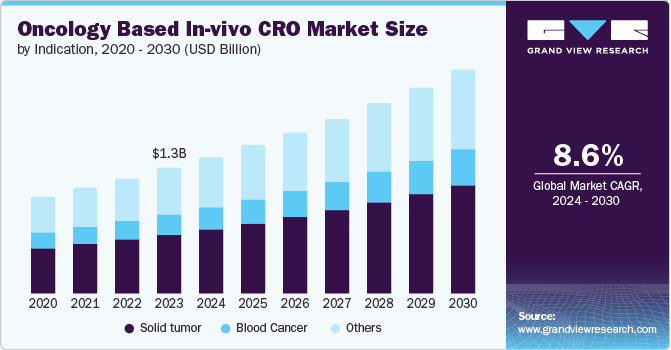
Furthermore, the changing landscape of CROs and increasing requirement for various drugs is expected to fuel the market growth in the upcoming years. Besides, Biopharmaceutical & pharmaceutical investments in therapies are driving the R&D activity together with drug development services. As, CROs have developed their products and services such that they help manufacturers in gaining momentum with their R&D processes. In addition, the uncertainty surrounding economies is likely to increase outsourcing & contracting as biopharma & pharma companies face these challenges. Generally, small & medium biopharma companies have a higher need for outsourcing as they have limited resources.
In addition, owing to their proficiency and years of experience in the business, CROs perform the given tasks at an exceptionally fast speed. According to a survey conducted by Tufts Center for the Study of Drug Development (CSDD) among the top management of major pharmaceutical companies, more than 75.0% of executives said that CROs are more time-efficient than internal teams, increasing the need for outsourcing.
Pharmaceutical organizations increasingly outsource R&D activities to CROs to stay competitive and flexible in a growing knowledge base, evolving technologies, and unstable economic environments. The tasks that companies prefer to outsource include a wide range of activities from basic research to late-stage development, such as target validation, hit exploration, lead optimization, genetic engineering, assay development safety, and efficacy tests in animal models and clinical trials involving humans.
Industry Dynamics
The oncology based in vivo CRO market growth stage is medium, and its pace is accelerating. The market is characterized by the level of M&A activities, the degree of innovation, the impact of regulations, product expansions, and regional expansions.
The oncology-based in vivo CRO product categories have observed advancements due to the increasing frequency of outsourcing of R&D activities by various pharmaceutical companies. This further supports the development of the most efficient, relevant study design and screening method to identify various compounds and optimize lead candidates.
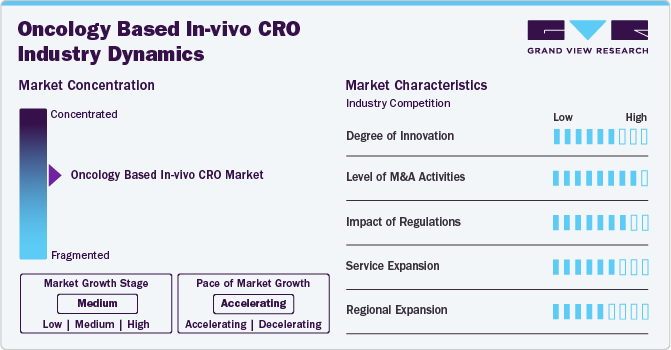
The growing presence of market players has made the market more competitive, leading to a rise in mergers and acquisitions. Besides, the market has been proven to facilitate gains, leadership retention, or international expansion.
Regulatory bodies and other authorities can influence the oncology-based in vivo CRO market. These regulations support the production of various oncology drugs using in vivo models.
Rising expansions, increasing R&D activities, and rising demand for various oncology-based drugs have led to a rise in demand for in-vivo CRO, further positively influencing the market dynamics.
The increase in R&D expenditure, the existence of technologically advanced service providers, and the rising requirement for oncology-based drugs have led the market growth.
Indication Insights
Based on indication, the market is segmented into blood cancer, solid tumors, and others. In 2023, the solid tumor tests segment accounted for the largest revenue share of 47.2%. The segment is also anticipated to register the fastest CAGR growth over the forecast period. The factor responsible for higher research in solid tumors is the presence of over 800 new molecules in the research pipeline undertaken by large pharmaceutical companies. Furthermore, the availability of grants from institutes such as NIH and NCI, and the existing gap between the demand and supply of treatments for solid cancer also remain promising drivers of growth. Solid tumors are abnormal tissue mass that grows during cancer and affects various body parts, including organs, muscles, and bones. These are generally addressed as carcinomas and sarcomas.
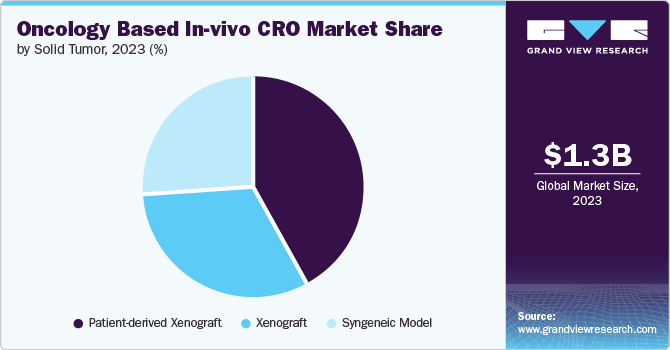
The blood cancer segment is anticipated to grow at a CAGR of 8.76% over the forecast period. The rapid rise in investigational molecules for oncology and research in stem cells is anticipated to promote high investment within the in-vivo space for oncology. Blood cancer is inclusive of all the tumors that are either generated in the blood or have the capability to migrate within the blood system. Broadly, these comprise myelomas, lymphomas, and leukemia. This is expected to drive the market over the forecast period.
Regional Insights
TheNorth America oncology based in-vivo CRO market held the largest revenue share of 49.97% globally in 2023. This can be attributed to technologically advanced CROs in this region. The U.S. has the highest per capita healthcare spending, and the availability of funding and grants from government organizations such as the National Institute of Health (NIH) promotes research activities. The trend for reducing the R&D cost is most common in major life sciences companies. Clinical trial sponsors are under pressure due to the increasing complexity of the research methodology to reduce time and cost. The increasing R&D activities and the need to reduce the overall trial expenditure are expected to drive the need for CROs in North America.
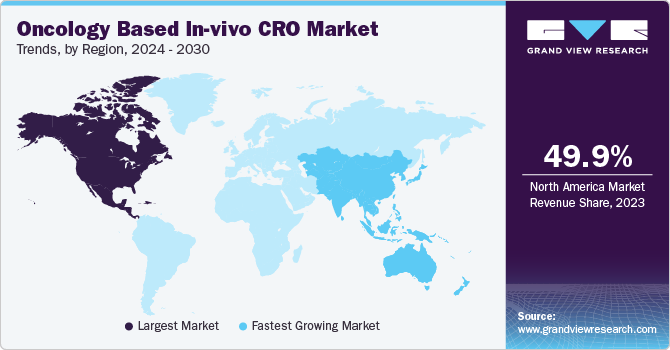
U.S. Oncology Based In-vivo CRO Market Trends
The U.S. oncology based in-vivo CRO market accounted for the largest revenue share in the North American region in 2023 owing to rising funding, established market players, and a growing pipeline of oncology drugs. In addition, the country has many market players offering comprehensive in-vivo CRO services for various cancer types. This significant presence of CRO service providers and increasing collaboration among research institutes has significantly increased the demand for these in-vivo CROs across oncology. For instance, in July 2023, The University of Texas MD Anderson Cancer Center & Nexo Therapeutics announced a collaboration to utilize innovative technology & capabilities of each organization at the earliest stages of drug discovery & development to rapidly advance new cancer therapies against undruggable targets.
Europe Oncology Based In-vivo CRO Market Trends
The Oncology based in-vivo CRO market in Europe is expected to grow significantly due to presence of a large number of CROs,growing focus on R&D activities, and increasing trend of outsourcing to European countries. This is expected to contribute to the increasing demand for the market in this region.
The Germany oncology-based in vivo CRO market held the largest share in the European region in 2023, owing to the government initiative for clinical research activities and rising strategic partnerships among companies. Besides, advancements in technology and growing research activities in oncology are expected to propel this market over the forecast period.
The oncology-based in vivo CRO market in the UK is anticipated to grow over the forecast period owing to increased demand for CRO. To gain a larger market, further decreasing production costs by complying with the regulatory structure prevalent across the EU is expected to contribute to market growth.
Asia Pacific Oncology Based In-vivo CRO Market Trends
The oncology-based in vivo CRO market in Asia Pacific is expected to grow at a CAGR of 9.22% over the forecast period. The constant improvement in healthcare infrastructure, the presence of untapped opportunities, economic development, and a huge patient base are some factors responsible for the rapid growth. This region also ranks on top in ease of doing business. Moreover, with qualified labor and other resources available, Asia Pacific would be the key destination for in-vivo CRO projects over the forecast period.
The oncology based in vivo CRO market in China held the largest share in the Asia Pacific region in 2023 due to the growing focus on R&D of novel treatments, increasing pharmaceutical companies outsourcing, and higher cost efficiency provided by Chinese CROs.
The Japan oncology based in vivo CRO market is expected to grow over the forecast period due to the increasing demand for preclinical trials outsourcing and growing adoption of outsourcing models drive the market growth.
The oncology-based in vivo CRO market in India is anticipated to grow at the fastest CAGR over the forecast period, owing to the availability of established market players and rising oncology drug innovations. Besides, partnerships between pharma, biotech, and CROs drive the market.
Key Oncology Based In-vivo CRO Company Insights
Several key players are adopting various strategic initiatives to strengthen their market position, offering CRO services for innovating various oncology-based in vivo drugs. The prominent strategies companies adopt are new launches, partnerships, agreements, mergers and acquisitions/joint ventures, expansions, and others to increase market presence and revenue and gain a competitive edge, driving market growth.
Key Oncology Based In-vivo CRO Companies:
The following are the leading companies in the oncology based in-vivo CRO market. These companies collectively hold the largest market share and dictate industry trends.
- Charles River Laboratory
- ICON Plc
- Thermo Fisher Scientific Inc.
- Eurofins Scientific
- Taconic Biosciences
- Crown Bioscience
- LabCorp
- WuXi AppTec
- EVOTEC
- The Jackson Laboratory
Recent Developments
-
In November 2023, Crown Bioscience launched the OrganoidXploreTM service. It is an organoid panel screening platform service that offers robust, reproducible, and clinical output at record speed, propelling preclinical oncology drug discovery and reshaping the landscape of cancer treatment development.
-
In October 2023, Coeptis Therapeutics Holdings, Inc. announced research demonstrating the possibility of the SNAP-CAR T-cell platform to target numerous antigens. The research involved SNAP-CAR to demonstrate the technology's adaptable antigen-targeting abilities in vivo and in-vitro in xenograft models of human tumors.
Oncology Based In-vivo CRO Market Report Scope
Report Attribute
Details
Market size value in 2024
USD 1.45 billion
Revenue forecast in 2030
USD 2.37 billion
Growth rate
CAGR of 8.58% from 2024 to 2030
Actual data
2018 - 2023
Forecast period
2024 - 2030
Quantitative units
Revenue in USD million/billion and CAGR from 2024 to 2030
Report coverage
Revenue forecast, company ranking, competitive landscape, growth factors, and trends
Segments covered
Indication, region
Country scope
U.S., Canada, Mexico, UK, Germany, France, Italy, Spain, Denmark, Sweden, Norway, Japan, China, India, South Korea, Australia, Thailand, Brazil, Argentina, South Africa, Saudi Arabia, UAE, Kuwait
Key companies profiled
Charles River Laboratory (CRL), ICON Plc, Thermo Fisher Scientific Inc., Eurofins Scientific, Taconic Biosciences, Crown Bioscience, Laboratory Corporation of America Holdings, WuXi AppTec, EVOTEC, The Jackson Laboratory
Customization scope
Free report customization (equivalent up to 8 analyst’s working days) with purchase. Addition or alteration to country, regional & segment scope.
Global Oncology Based In-vivo CRO Market Report Segmentation
This report forecasts revenue growth at the regional and country levels and provides an analysis of the latest industry trends in each of the sub-segments from 2018 to 2030. For this study, Grand View Research has segmented the global oncology based in-vivo CRO market report on the basis of indication, and region:
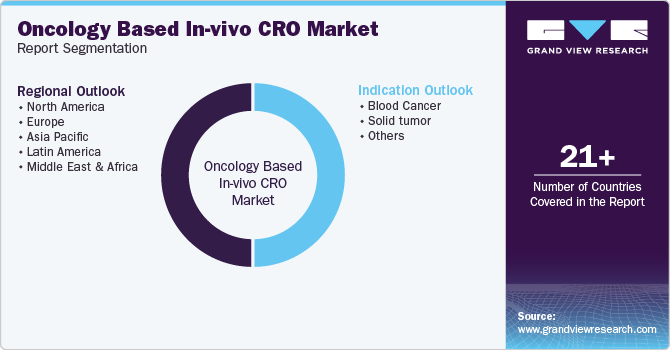
-
Indication Outlook (Revenue, USD Million, 2018 - 2030)
-
Blood cancer
-
Syngeneic model
-
Patient-derived Xenograft
-
Xenograft
-
-
Solid tumors
-
Syngeneic model
-
Patient-derived Xenograft
-
Xenograft
-
-
Others
-
Syngeneic model
-
Patient-derived Xenograft
-
Xenograft
-
-
-
Regional Outlook (Revenue, USD Million, 2018 - 2030)
-
North America
-
U.S.
-
Canada
-
Mexico
-
-
Europe
-
U.K.
-
Germany
-
France
-
Italy
-
Spain
-
Denmark
-
Sweden
-
Norway
-
-
Asia Pacific
-
Japan
-
China
-
India
-
Australia
-
South Korea
-
Thailand
-
-
Latin America
-
Brazil
-
Argentina
-
-
Middle East & Africa
-
South Africa
-
Saudi Arabia
-
UAE
-
Kuwait
-
-
Frequently Asked Questions About This Report
b. The global oncology based in-vivo contract research organization market size was estimated at USD 1.33 billion in 2023 and is expected to reach USD 1.45 billion in 2024.
b. The global oncology based in-vivo contract research organization market is expected to grow at a compound annual growth rate of 8.58% from 2024 to 2030 to reach USD 2.37 billion by 2030.
b. North America dominated the oncology based in-vivo contract research organization market with a share of 49.97% in 2023. This can be attributed to technologically advanced CROs in this region. In addition, the trend for reducing the R&D cost is most common in major life sciences companies is expected to contribute to the increasing demand for the market in this region.
b. Some key players operating in the oncology based in-vivo contract research organization market include Charles River Laboratory (CRL), ICON Plc, Thermo Fisher Scientific Inc., Eurofins Scientific, Taconic Biosciences, Crown Bioscience, Laboratory Corporation of America Holdings, WuXi AppTec, EVOTEC, and The Jackson Laboratory among others
b. Key factors driving the growth of the oncology based in-vivo contract research organization market include accelerating the time to market, rising economic efficiency, increasing mergers and collaborations, and growing outsourcing of R&D activities.
Share this report with your colleague or friend.
![gvr icn]()
NEED A CUSTOM REPORT?
We can customize every report - free of charge - including purchasing stand-alone sections or country-level reports, as well as offer affordable discounts for start-ups & universities. Contact us now
![Certified Icon]()
We are GDPR and CCPA compliant! Your transaction & personal information is safe and secure. For more details, please read our privacy policy.
We are committed towards customer satisfaction, and quality service.
"The quality of research they have done for us has been excellent."





